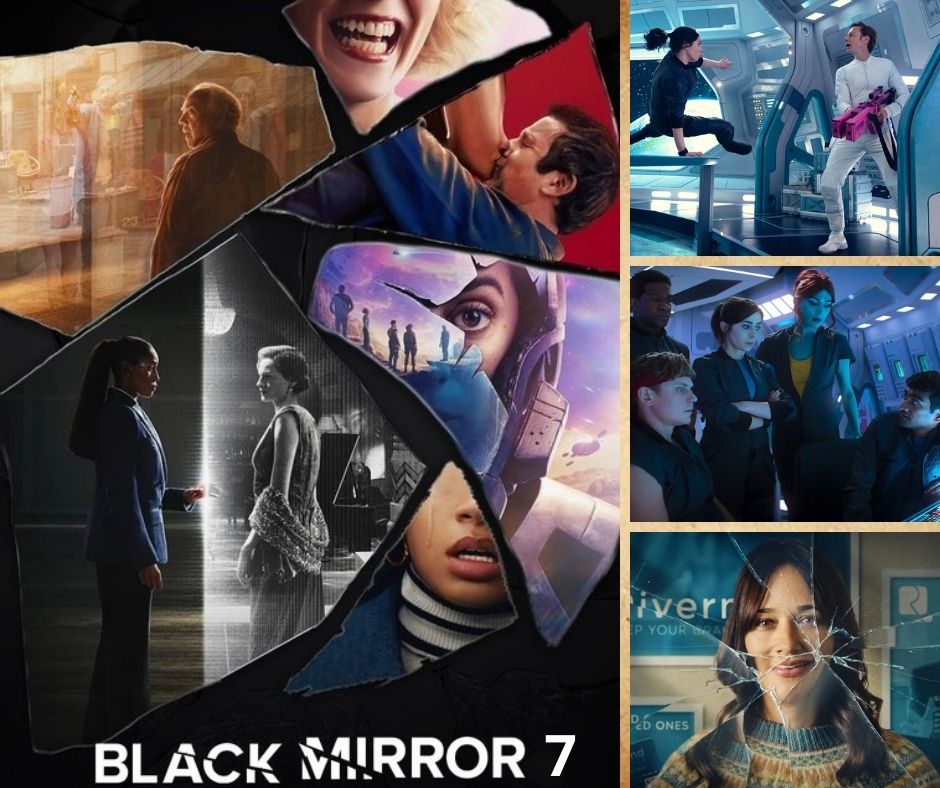Black Mirror (Season 7)
A Nostalgic but Safe Return

Once a cultural phenomenon, Black Mirror arguably hit its creative peak during its first two seasons on Netflix, after moving from Channel 4 in 2015 ahead of Season 3. What began as a low-budget but sharp and unsettling series scaled up impressively into a bigger-budget, more ambitious production in Seasons 3 and 4—delivering some of its best episodes like Nosedive, San Junipero, USS Callister, and Black Museum. After that, Netflix’s experiment with interactivity in Bandersnatch felt more like a novelty than a meaningful evolution of the series. Since then, the returns have been diminishing. Season 6 was widely seen as a creative low point, with many critics and fans calling it the show’s weakest stretch yet.
So Season 7 arrives with something to prove. There’s still a lot of goodwill toward the series thanks to those early high points, but this new batch of episodes had the burden of showing that Black Mirror can still deliver thought-provoking dilemmas, emotional gut-punches, or at the very least, cool speculative ideas. Creator Charlie Brooker admitted he wanted to bring the show back to its roots—and in a way, he did. Not necessarily to the small, bleak stories of the early seasons, but more to the emotional and conceptual resonance that defined its Netflix-era peak.
The result is a capable and efficient echo of those past glories. There’s a clear attempt to evoke nostalgia for the show’s stronger seasons—one episode leans into the emotional catharsis of San Junipero, another riffs on the revenge dynamics of USS Callister, and another one is a direct sequel to that very episode. Old characters and familiar tech ideas reappear, giving the season a subtle case of déjà vu. At this point, things feel a little more predictable, but there’s also comfort in the familiar. In chasing its past success, Season 7 comes close enough to offer a fast-food version of earlier, more gourmet entries—enjoyable, but not transcendent.
Breaking it down episode by episode:
Episode 1: Common People (3.5/5)
A strong start. It tackles themes of privatized healthcare and rising subscription costs (ironically, from Netflix itself). The emotional core—centered on a couple played by Rashida Jones and Chris O’Dowd—is genuinely touching, and Tracee Ellis Ross plays a corporate rep so grating she makes you wish someone would trap her inside the punishment simulator from White Bear. The episode builds to a poignant and bittersweet conclusion that lands with just enough emotional weight to linger.
Episode 2: Bête Noire (3/5)
A vengeance-driven story that mostly coasts until a final twist in the last few minutes. It’s watchable but feels overly familiar.
Episode 3: Hotel Reverie (3/5)
Features the season’s best performance from Emma Corrin, who brings depth and melancholy to an otherwise clunky concept. Issa Rae and Awkwafina are annoying, and the episode was clearly written by someone who doesn’t understand IT (“It’s a stack overflow!”). The exploration of AI consciousness feels a bit tired at this point, though Corrin makes some of it work.
Episode 4: Plaything (2.5/5)
The Thronglets—adorable digital creatures—are a highlight, and watching a few of them meet a tragic end is oddly enfuriating. But the episode ends with an underwhelming finale that feels too close to Lucy or Transcendence.
Episode 5: Eulogy (3.5/5)
Paul Giamatti is good as always in a memory-driven story that evokes Eternal Sunshine of the Spotless Mind. There are good emotional scenes, although a last act coincidence (involving not seeing a note) is too much of a contrivance to make the ending really hit.
Episode 6: USS Callister: Into Infinity (3.5/5)
The direct sequel to USS Callister is a fine expansion of that episode. It’s nice seeing the characters again, and Jesse Plemons is always great at playing creepy. The episode doesn’t really take the game concept in any bold new direction, and the whole “virtual escapism” angle is kind of pushed aside. Still, it’s an entertaining ride, with a good mix of tension and fun moments—and this time, we even get to see another side of Jimmi Simpson (including things I didn’t want to see from him). It features a strong final scene and ends the season on its best note.
(My ranking: 6, 1, 5, 2, 3, 4)
At the end, Black Mirror Season 7 is a fine expansion of the series. It doesn’t bring anything new or groundbreaking to the table, but it’s entertaining and a clear step up from the blandness of Season 6. It never challenges the show’s best episodes, but it also doesn’t embarrass the legacy either. There’s still something satisfying about watching Charlie Brooker play in this world—and while the mirror may be a bit smudged, it still reflects just enough to be worth a look.